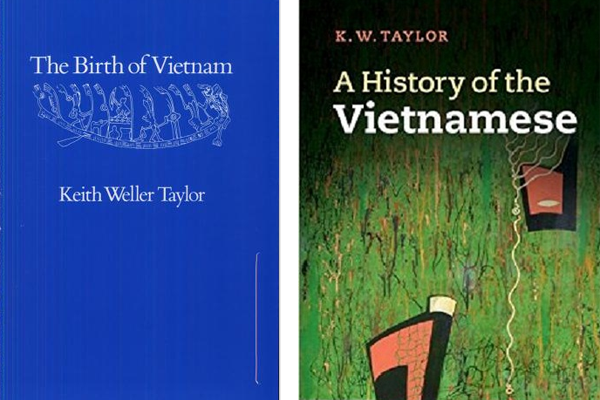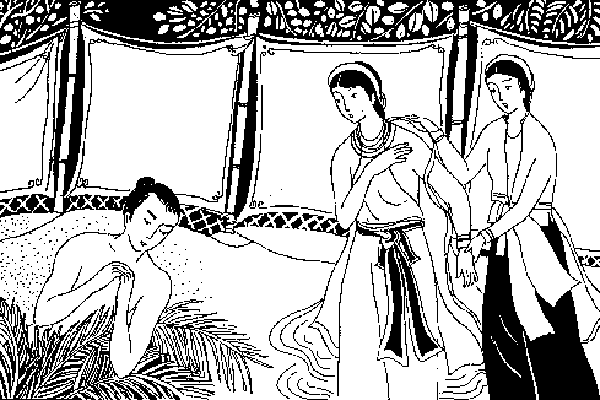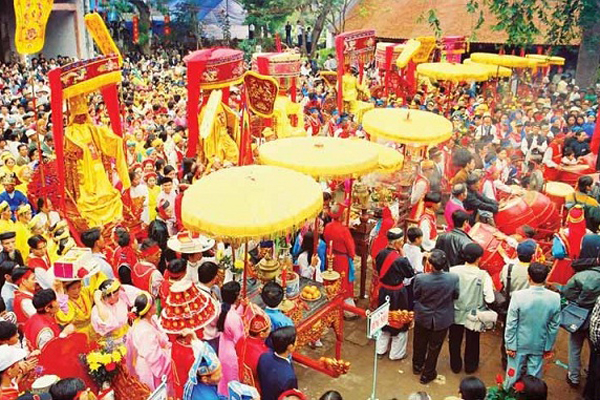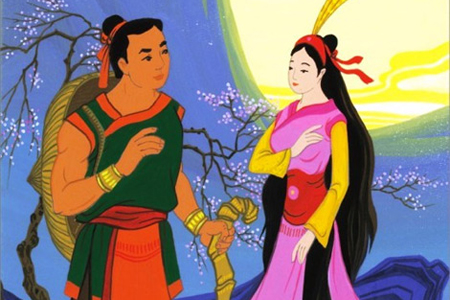In "The Birth of Vietnam" the author, American historian Keith W. Taylor, insists on the importance of myths that assisted the emergence of the nation in the first millennium B.C. Of particular interest to Taylor is Nhat Da Trach (the Marsh of One Night) which, with the exception of the erotic stories in a collection called Tieu Lam (Laughter Forest), is the most daring literary work in the old days.
That the story has for a hero a naked young man proves that it is older than the history of Confucianism in Vietnam although in its definitive version it seems, with Buddhist epilogue, to date back to the period of Chinese domination.

In the days of King Hung there lived a man so poor that he had to share his only loin cloth with his son, Chu Dong Tu. When the father died, the loin cloth was used to shroud his body, and the son was left without a stitch.
From then on Chu Dong Tu had to go fishing at night only. During the day time he kept himself out of sight.
Very early one morning in spring, Chu Dong Tu heard the sounds of drums and gongs and soon he saw boats coming, bedecked with gay parasols and bunting.
Scared, he threw his dip net into a bush and buried himself in the sand.
The boats were carrying princess Tien Dung (Fairy Beauty) and her entourage on one of her frequent outings. The princess had no mind for marriage. Her only joy was to travel and see as much of the country as she could.
On that particular morning the shore of the river looked so charming to the princess, she decided to take a bath and a pavilion was set up there and then for the purpose.

Inside, the princess took off her clothes and began to bathe. The fresh water she was pouring over her body gradually washed away the sand under her feet and soon revealed Chu Dong Tu in his hiding.
The shock of the princess was as great as the confusion of the young man. He begged her pardon and told her the whole story of his life.
"I've vowed never to take a husband ", said a moved Tien Dung after she had heard the story. "But heaven has caused us to meet today, so we have to bow to destiny".
The two became husband and wife that same day, to the great wrath of the king, who banished his willful daughter from the court.
So Tien Dung stayed with her husband in that godforsaken village. Chu Dong Tu would travel to distant places to exchange his catch for food. During one such trip he came to a mountain where he met a young bonze named Phat Quang (Buddha's Light). He stayed there for one year to study Buddhism.
When Chu Dong Tu decided to return to Tien Dung, the bonze gave him a stick and a palm hat as a parting gift.
Back home Chu Dong Tu taught his wife the Word of Buddha and, together, the two went away.
One night, they came to a desert place. Chu Dong Tu put up a makeshift shelter by planting the stick in the ground and placing the hat on the high end.
When they woke up they found themselves in a palace built of jade and emerald, surrounded by soldiers and servants.

The king soon learned about what had happened. Suspecting a revolt on the part of his daughter and son-in-law, he sent an army after them.
Night was falling as the king’s army arrived at the place, and it was decided that the troops would wait for daybreak to launch the attack.
At midnight, however, a storm broke out, taking to heaven Chu Dong Tu, his wife, their palace and all their servants and soldiers, leaving on the ground a vast marsh which later was named Marsh of One Night.
A temple was then erected at the place by order of the king for the worship of Chu Dong Tu and Tien Dung.
Ever since a festival has been held every year, on the 10th day of the first lunar month, at Chu Xa village, Ha Bac province.



